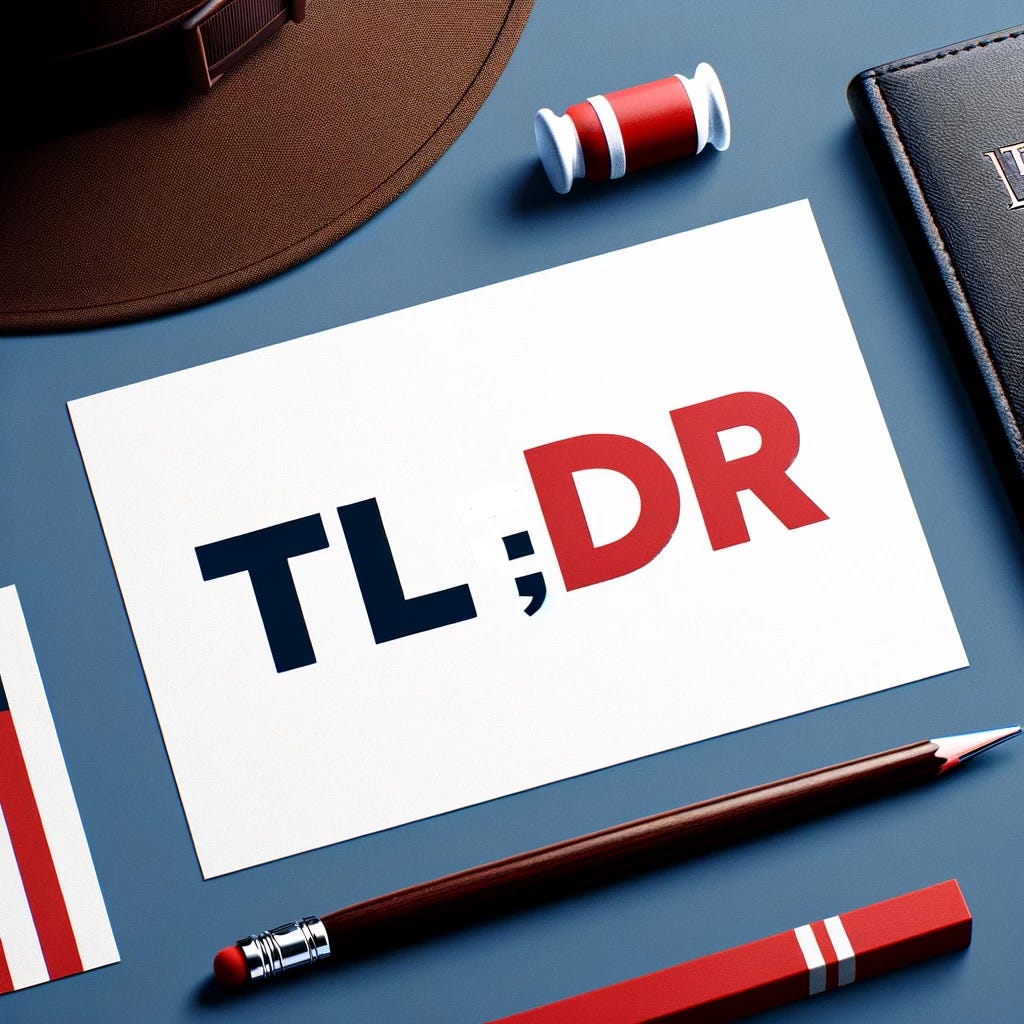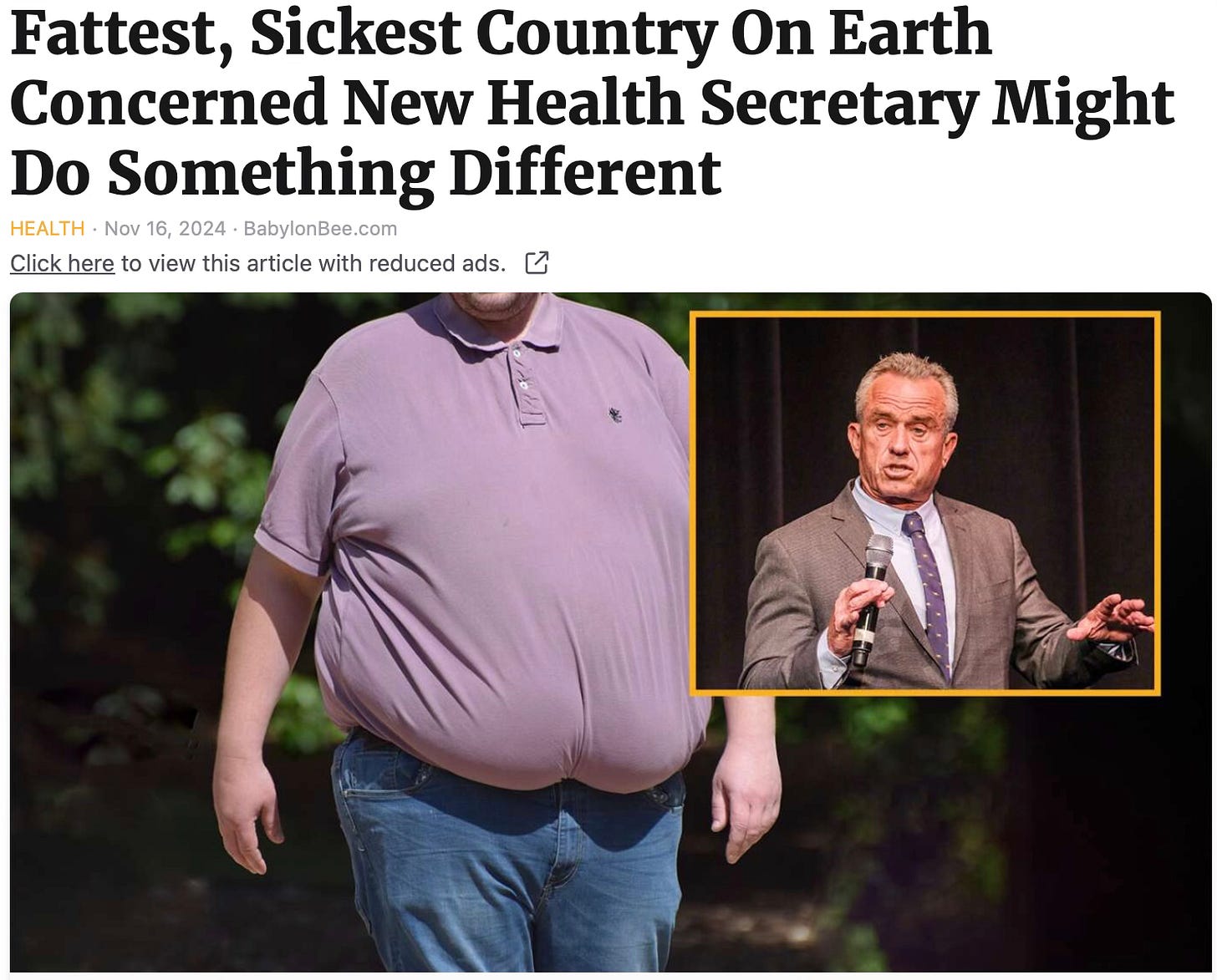Unusual Times Call for Straightforward Leadership
Connecting the dots between public frustration, polarizing figures, and governing challenges
This just in: We live in unusual times. Public frustration with institutional trust is undeniably palpable.
Example 1: An all-time controversial candidate wins presidential election. And by a comfortable margin.
Example 2: Said winner announces he’s selected a well-known vaccine critic — who once relocated a dead bear cub to Central Park and whose daughter said he cut the head off a beached whale and tied it onto the roof of the family car — to run the most powerful federal agency for public health.
Example 3: An insurance CEO (and father of two) is gunned down on a New York City street in broad daylight and thousands go online to defend and even cheer the murderer.
Today’s TL;dr takes on a Triple Lindy-level challenge to connect the dots and make some sense of the weirdness and why it matters for those in the business of governing. Take a deep breath, and let’s make that improbable dive together.
Long story short is people are massively frustrated with the powers that be. For Example 1, on Trump winning the presidential election, I’ll return an observation made by journalist Eli Lake that I shared in a post a few weeks ago. How does a guy who denied the 2020 election results and then fomented the Jan. 6 madness at the Capitol win re-election? Because, Lake argues, the opposition presented a greater threat to democratic norms in the eyes of voters.
The alternative to Trump was a party that weaponized the justice system against him, that used the government’s power and influence to censor critics on social media, all while declaring their fidelity to the Constitution and democracy.
That rankled people. They forgave Trump's sinister bullshit because his opponents put forward a kind of lie that violating democratic norms actually preserved them.
Emphasis mine. The lesson for government types? Always play it straight — two wrongs don’t make a right.
On to Example 2 …
The Search for Answers About Public Health
This chart tells a sobering story about American healthcare.
We’re clearly not getting much bang for our healthcare bucks. So maybe Robert F. Kennedy Jr. as Secretary of Health and Human Services isn’t such a crazy choice after all? The Babylon Bee, my go-source for satire these days, put it this way:
It’s funny because it’s true.
Humor aside, a serious take can be found in this article by Dr. Vinay Prasad evaluating RFJ Jr.’s controversial ideas for public health. While RFK Jr. is widely criticized as a conspiracy theorist, Prasad suggests a “litmus test” to assess his policies: Do other nations implement similar practices? If so, the ideas warrant discussion.
Key points include:
Raw Milk: RFK Jr. advocates legalizing raw milk sales. Many countries, including England and France, allow it, suggesting it’s a calculated risk for consumers.
Vaccines: While RFK Jr.’s claims linking MMR vaccines to autism are debunked and harmful, his criticism of vaccine manufacturers’ immunity from lawsuits and calls for more flexible childhood immunization schedules align with policies in some European nations.
COVID-19 Policies: RFK Jr.’s stances — opposing school lockdowns, masking children, and mandating vaccines for kids — mirror approaches taken by countries like Sweden, which avoided harsh restrictions with relatively good outcomes.
Fluoride: Questioning water fluoridation is not unique, as several European nations also avoid the practice. Emerging studies on potential cognitive risks call for further investigation.
Food Additives: RFK Jr. critiques artificial food dyes used in the U.S., which are often replaced by natural alternatives in European products. This argument is backed by evidence and resonates with broader calls for healthier food standards.
Prasad concludes that while some of RFK Jr.’s positions are flawed, others reflect global practices and deserve serious debate rather than outright dismissal.
That’s a wise practice for anyone in the government business. Don’t dismiss a suggestion or idea just because it comes from someone you don’t like or has been a consistent critic.
A Tough Pill to Swallow
For another take on RFK Jr’s nomination, we turn to Your Local Epidemiologist, a Substack “whose main goal is to ‘translate’ the ever-evolving public health science so that people will be well-equipped to make evidence-based decisions.” GGF faithful will recall our review of YLE’s excellent series that took a hard-nosed look at what went wrong with the COVID vaccine rollout.
Dr. Katelyn Jetelina expresses deep concern over Kennedy's nomination as Secretary of Health and Human Services. She wrote:
How do you express, in a few lines, the unsettling reality that someone with a catalog of lies so long is now tapped to be in charge of the public’s health? From his false claims that vaccines cause autism (they don’t), or that HIV does not cause AIDS (it does), or antidepressants are linked to mass shootings (they aren’t), or chemicals in water making kids trans (they don’t), or to Wi-Fi causing cancer (it doesn’t). The list of falsehoods feels endless.
How do you effectively warn about the oncoming hurricane of confusion and anxiety? Or, worse, the heartbreak because people will make ill-informed decisions when they really are just trying to do what they think is best? The dread because I know damn well that a “lie can go around the world before the truth gets its pants on.”
How do you capture the gravity of the moment as public health workers and scientists brace for the undermining of critical health programs and resources—built over decades—to be dismantled or misdirected?
Despite these challenges, Dr. Jetelina emphasizes her commitment to continuing the fight for truth and reliable scientific communication, encouraging resilience in the face of what feels like a major setback for public health advocacy.
Thank goodness YLE will keep fighting the good fight. It’s an uphill battle, alas, because — back to my original point — folks are upset by overreach and obfuscation by those who should know better. This frustration also extends to perceptions that modern healthcare prioritizes treatments over prevention, a sentiment fueling RFK Jr.’s appeal.
What Happened to Eating Right and Exercising?
A Wall Street Journal article on “How Science Lost America’s Trust” notes many Americans, skeptical of traditional medicine, feel that modern healthcare focuses too heavily on treatments like vaccines and medications while neglecting preventive measures and healthy lifestyles. For them, Kennedy’s approach to Make America Healthy Again rings true.
Kennedy’s criticism of ultra-processed foods, environmental toxins, and the medical system’s emphasis on symptom management resonates with those who believe the healthcare system fails to address the root causes of chronic diseases like obesity and cancer. This sentiment united diverse groups disillusioned by COVID-19 restrictions and their long-term impacts, such as school closures and lockdowns.
Frustration with Insurance Takes a Dark Turn
I admit to being totally unprepared for the surprising public reaction in some quarters to the murder of UnitedHealthcare CEO Brian Thompson. Social posts like this were common.
On his X profile, Zenkus states he teaches at Columbia and describes himself as “Anti-violence” and a “Trauma expert.”
In The Free Press, Kat Rosenfield writes people like Zenkus “are treating this real murder of a real person as though it were the emotionally cathartic climax of a John Wick movie—the part where the archetypal villain gets his just deserts. The police later revealed that the bullets fired at Thompson had the industry terms deny, defend, and depose written on them—a cinematic detail that only further encouraged the notion that he was killed as vengeance for UnitedHealthcare’s misdeeds.”
In an interview, U.S. Rep. Ro Khanna, a California Democrat, condemned the murder of Thompson as “horrific” but noted he was unsurprised by the public response.
Khanna’s acknowledgment of public frustration underscores a broader issue: systemic inequities in healthcare and insurance practices that leave Americans feeling powerless. The murder has reignited debate over inequities in the U.S. healthcare system. Khanna emphasized that for-profit insurers, like UnitedHealthcare, enrich executives while leaving millions of Americans uninsured or underinsured.
Khanna said he agrees with the assessment of independent Sen. Bernie Sanders, who wrote: "We waste hundreds of billions a year on health care administrative expenses that make insurance CEOs and wealthy stockholders incredibly rich while 85 million Americans go uninsured or underinsured. Health care is a human right. We need Medicare for All."
Is it possible Thompson’s murder and some of the public’s dark reaction to it could result in real momentum to bring about legislative changes to the insurance industry? I don’t know of anyone who hasn’t been frustrated dealing with insurance companies and/or the rising cost of coverage. I could write a separate post on issues with insurance practices that have impacted me personally. I’m guessing most of you could, too.
While most would welcome changes to insurance regulations that could rein in costs and improve outcomes, how bizarre would it be if that was one result of the killer’s actions and public support for them? I need only remind you of the lede for today’s newsletter: We live in unusual times.
What All This Weirdness Means for Those in the Business of Governing
On the issue of someone as polarizing as RFJ Jr. potentially leading the Department of Health and Human Services, as noted above his nomination is a possibility because people have lost faith in the credibility of many in the “expert” class. So, here’s my advice those readers working in government: tell stories that SHOW the competence of your public servants, be they engineers, police officers or parks maintenance workers.
I shared some great examples of that kind of effort last year:
While there’s little government types can do to stop someone like Thompson’s murderer, there is something legislators can do about what appears to be the issue the shooter was upset about and what has resonated with so many: seemingly unfair insurance practices.
The GGF takeaway is this: You’ve got to get adept at articulating the problem, be it cumbersome insurance regulations or the cause of rush-hour traffic. For a helpful look at how to explain the problem with insurance, we turn to veteran journalist Kevin D. Williamson.
Writing in The Dispatch, Williamson notes changes would be welcomed but people first need to understand what insurance is and is not. In his essay, Williamson critiques the moral and emotional rhetoric surrounding health insurance, arguing that such attitudes exacerbate misunderstandings about its purpose. He emphasizes that health insurance is a financial tool, not a moral or medical service, designed to hedge against unexpected, costly health events rather than to prepay routine medical expenses.
Williamson laments both the U.S. healthcare system and public misconceptions, noting that attempts to mimic European systems like Switzerland’s fail due to cultural and structural differences. He notes the last major health insurance reform — the Affordable Care Act, aka Obamacare — has failed to deliver the intended results for a simple reason. “The ACA was an attempt to graft the basics of the Swiss system onto the American system—but, of course, it was designed by Americans, which meant that the authors tried to do it on the cheap and without the hard and unpopular parts.”
(A) lot of people who were smart enough to notice that Switzerland has a very good health care system [but] were not smart enough to appreciate that Switzerland is full of Swiss people, while the United States is full of ungovernable maniacs.
He highlights how the U.S. system blends private insurance with heavy government regulation, leading to inefficiencies and frustration for consumers. To improve the system, Williamson calls for clarity about the purpose of insurance and for reforms that focus on practical solutions rather than ideological or emotional debates.
Not holding my breath on that last thought, but again, we live in unusual times. Anything’s possible — even something positive! Williamson’s advice — clarifying the purpose of health insurance and aligning it with practical solutions — could guide policymakers in building trust and improving outcomes.
Social Media Post of the Week
This post captures some of the dark humor and class frustration underlying public reactions to the Thompson case — and pretty much every other controversy in these mind-bending times.
The Last Word
We leave to gonzo journalist and author Hunter S. Thompson, who reminds us we have the power to choose our path.
It is not necessary to accept the choices handed down to you by life as you know it. There is more to it than that — no one HAS to do something he doesn't want to do for the rest of his life. But then again, if that’s what you wind up doing, by all means convince yourself that you HAD to do it. You’ll have lots of company.
Source: Letter to Hume Logan (April 22, 1958) as featured in Letters of Note with a h/t to James Clear.
Onward and Upward.









